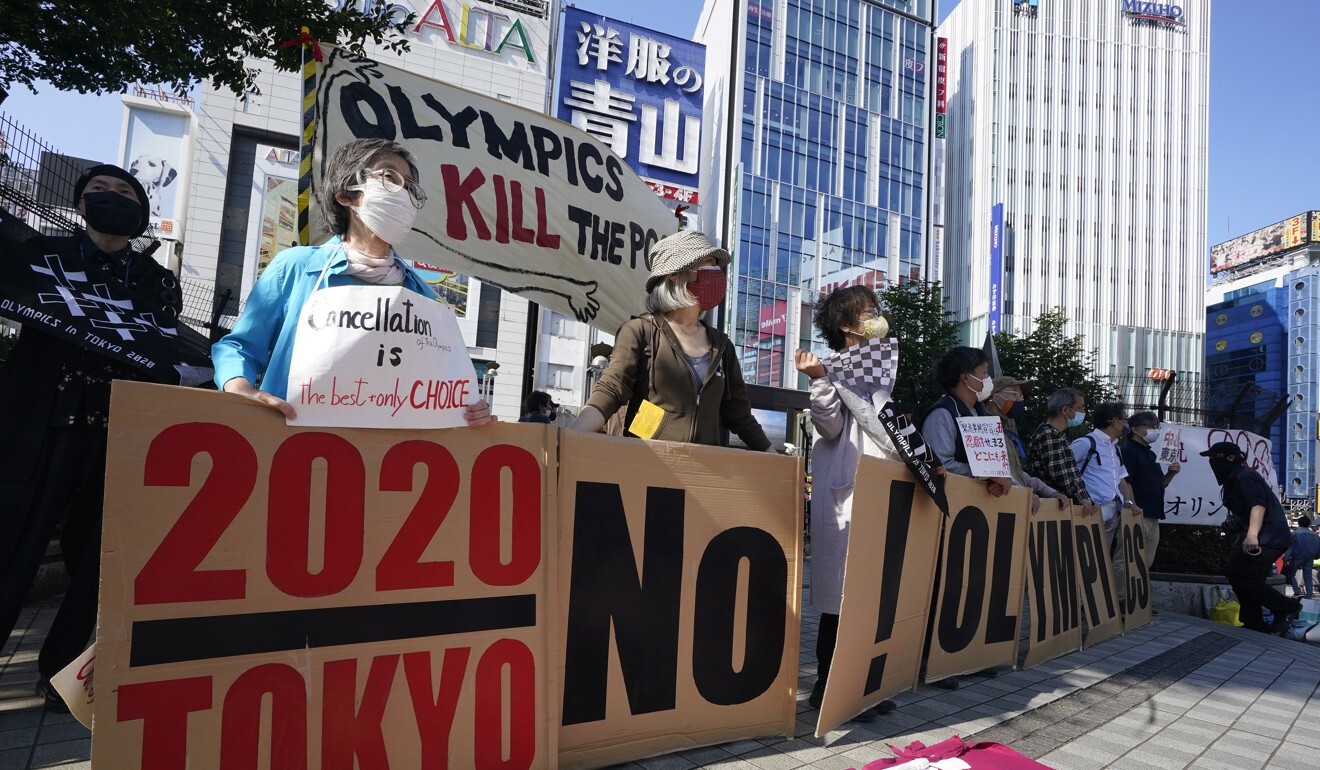
Tokyo Olympics: SoftBank CEO Masayoshi Son warns Japan has ‘a lot to lose’ by proceeding with Games
- With just two months to go until the Games, much of Japan remains under state-of-emergency restrictions, including Tokyo
- Japan has vaccinated just 4.4 per cent of its population, the slowest among the world’s most developed countries
“Currently more than 80 per cent of people want the Olympics to be postponed or cancelled. Who and on what authority is it being forced through?” the billionaire executive wrote in a Twitter post in Japanese.
In a follow-up tweet late on Sunday, he wrote: “Does the IOC [International Olympic Committee] have the power to decide that the Games would go ahead?
“There’s talk about a huge penalty [if the Games are cancelled] but if 100,000 people from 200 countries descend on vaccine-laggard Japan and the mutant variant spreads, I think we could lose a lot more: lives, the burden of subsidies if a state of emergency is called, a fall in gross domestic product, and the public’s patience.”
Son’s tweets followed comments on Friday from International Olympic Committee (IOC) vice-president John Coates that the Olympics would “absolutely” go ahead even if Tokyo was under a state of emergency.
With just two months to go until the Games, much of Japan remains under state-of-emergency restrictions, including Tokyo, as the spread of infectious coronavirus variants strains the medical system. That has kept the majority of the public opposed to holding the Games this year.
Organisers are set to decide next month if local spectators will be allowed to attend events.
Barring domestic fans would deliver a significant financial blow, eliminating a major source of revenue.
Their absence would also dampen consumption and spending by sponsors counting on most ticket holders being allowed to attend. Yet a ban would ease the strain expected on an already stretched medical system, and may be the organisers’ last card to play in order to pull off the Games at all.
“We are prepared for no spectators,” Seiko Hashimoto, president of the Japan Olympic Organising Committee, said late last month. “But we want as many people to watch as the situation allows.”
Why Tokyo thinks the 2020 Olympics show must go on
Japan has expanded and extended a third state of emergency as cases continue to climb throughout the country. They have largely been driven by more infectious strains from abroad, adding to concerns about inviting thousands of overseas participants. Foreign athletes, meanwhile, have expressed safety concerns, with the US track and field team cancelling pre-Olympics training in the country.
A recent poll by the Asahi newspaper found 59 per cent of respondents were against any fans, up from 45 per cent in April, with those in favour of just capping attendance dipping to 33 per cent from 49 per cent. While the public may favour no fans, it would create a significant financial burden; organisers are projecting about US$800 million from ticket sales.
Initially, 600,000 fans from abroad had been projected to attend, but organisers ruled out that possibility in March, and punted a decision on domestic spectators to June as cases in Japan rose.
Rather than the state of the pandemic, however, the decision may hinge on the ability to secure medical staff. Japanese professional sports have continued to welcome fans in limited numbers even during the state of emergency, with baseball and soccer games capping spectators at 5,000 per game after extending the current emergency.
Japan cuts size of foreign Olympics delegations as opposition to Games grows
“They are considering holding the Olympics without spectators even though various other sports events are welcoming them; this will probably help from the standpoint of reducing the burden on medical staff,” said Hiroshi Okudera, a professor at the University of Toyama, who was responsible for medical care at the Nagano Winter Olympics in 1998.
Fans make up a sizeable portion of those who need medical attention at the Games, especially considering the punishing summer temperatures in Tokyo. At the Nagano Games, about 30 per cent of those who required medical care were spectators, according to Okudera.

Hashimoto said on Friday that the event would need as many as 230 doctors and 310 nurses a day, with around 80 per cent of them secured. Organisers have also reduced the number of officials and others expected to attend from overseas to around 78,000, not including athletes.
The International Olympic Committee will send some medical staff to Tokyo, President Thomas Bach said last week, without specifying a figure.
Even during the states of emergency, Tokyo is unrecognisable from locked-down capitals elsewhere, with restaurants, schools and many workplaces operating as normal, with reduced operating hours. Residents of Japan bought a total of 4.45 million tickets to events, though 810,000 of those were returned during a refund programme.
Additional reporting by Bloomberg

